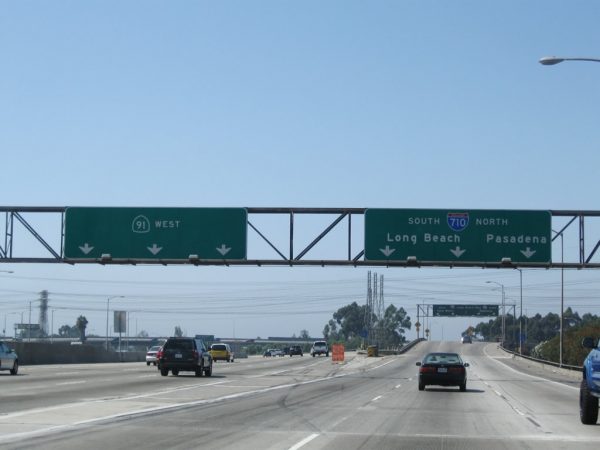California, the self-proclaimed leader of the resistance on climate change action and emissions reductions, is about to steamroll over black, brown, and other communities of color with plans to expand a massive freeway in Southern California.


(Photo by Spandido/Creative Commons Attribution-Share Alike 3.0 Unported)
One plan to expand the 710 South freeway —a main artery to move goods from the top and most contaminating port complex in the nation— calls for the state to kick residents out of their homes, and do the construction without any assurances of targeted hiring for the communities impacted. The other plan would take steps to mitigate worsening air pollution from increased truck traffic from the ports, but force even more residents out of their homes and again do nothing for local jobs. Caltrans District 7, the state agency leading the project, is essentially asking low income families to pick their poison: either agree to breathing more bad air or agree to more people losing their homes. No one should be forced to make such a choice.
Southern California is known for its expansive freeways. Given the national and international importance of the Long Beach and the Los Angeles ports in moving goods, the city’s infrastructure is critical to our nation’s economy. The project has even been included on Governor Brown’s list of priorities for funding from Trump’s infrastructure goals. And as one of the biggest highway projects in the nation, it will set a precedent nationally in transportation planning. There are a lot of eyes on this 710 expansion, and it needs to be done right. As it stands, what’s being proposed could harm the health of hundreds of thousands that reside along the 710 corridor by exacerbating toxic air pollution and displace hundreds of local families, including businesses and homeless shelters.
From the beginning, this project has ignored the full scope of pollution and displacement implications it would have on local families. When Caltrans released their first Draft Environmental Impact Report (DEIR) back in 2012, the EPA gave it the worst grade such type of report can get: an “EU,” for “Environmentally Unsatisfactory.” Since the beginning of the project, the community has been involved, pushing for measures to eliminate displacement of homes, adoption of zero emissions technology, and a targeted hiring policy for local families to benefit from the job creation the project could bring, and other community benefits. Instead of listening, Caltrans largely ignored much of what local communities proposed.
Would this project ignore local community concerns if it proposed to plow through more affluent communities? Last year, a proposal to extend the 710 freeway, north of Los Angeles, through wealthier neighborhoods, went nowhere. It was rejected unanimously by the LA Metro Board in large part because of community concerns. Why would Caltrans presume that the concerns of the 18 communities along the 710 South corridor, which are largely low income communities of color, would be less important?
The question now for local and state leaders, who are set to vote on the project this week, is whether they are going to stand by and allow Caltrans to force feed these communities an inherently unjust choice that pits public health vs. people’s homes, or if they will stand up and demand better for our families. The area along the corridor is already negatively and disproportionately affected by high levels of air pollution, asthma rates, and other health conditions. Southern California has the worst ground-level ozone pollution in nation, with big rig trucks being the biggest contributors to the problem. Truck pollution, by the way, can affect health conditions and related mortality rates —including respiratory, cardiovascular, birth defects, and cancer. With truck traffic along the corridor expected to increase dramatically in the coming years, the decision would lead to negative impacts for decades to come.
California has made significant gains as a leader on addressing air pollution and representation of communities of color. The 710 South expansion project stands to undermine 17 years of hard work on these fronts. That’s why the communities that would have to live with the repercussions of this massive project are asking state and local officials to step in. Caltrans and Metro LA must consider and study the safest alternative that will pave the way for taking advantage of a zero-emissions corridor and to eliminate displacement, while providing maximum benefits to the local communities that need them the most. We can’t be a climate action and emissions reductions leader if it that doesn’t include protecting black, brown, and other communities of color against pollution AND displacement from their homes.
***
Dilia Ortega leads local organizing efforts with Communities for a Better Environment, through the Coalition for Environmental Health and Justice, and is a resident of Southeast Los Angeles.


